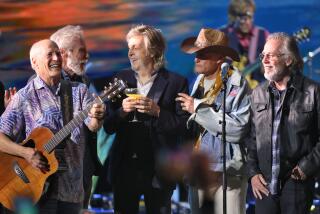Drummer Takes Lead in Special Performance
- Share via
Jack DeJohnette generally is regarded as one of the finest living jazz drummers, a limber musical thinker and technical dynamo, one who challenges tradition by pushing outward while digging in.
His resume bubbles over with notable gigs, beginning with work in Charles Lloyd’s popular ‘60s group--which also featured a young Keith Jarrett--and then in an early group in Miles Davis’ electric era.
These days, DeJohnette has gained considerable attention for being one-third of a group. He, along with bassist Gary Peacock are attached to Keith Jarrett’s Standards Trio. DeJohnette also has revived the ethereal-electric Gateway Trio, with guitarist John Abercrombie and bassist Dave Holland, which released “Homecoming” last year and will release “In the Moment” this fall.
But, apart from his work as a side man and cohort, an underrated aspect of DeJohnette’s rich musical life has been his work as an innovative leader. His now sizable discography reveals a musician who has never been satisfied with the stylistic status quo. In such bands as his New Directions in the ‘70s and Special Edition in the ‘80s, DeJohnette has blended genres and expanded horizons.
It will be in the role of leader that DeJohnette appears Monday night at the intimate Jazz Hall in Santa Barbara, in another programming coup for that club. This special one-nighter comes as DeJohnette begins touring the United States, in a lead capacity for the first time since 1990, with what he calls the “Oneness Band,” long-standing collaborator pianist Mike Cain, guitarist-bassist Jerome Harris, and percussionist Joakim Lartey.
The tour comes on the heels of DeJohnette’s new album, “Dancing with Nature Spirits,” a more open and free-spirited recording than his last few, and his first for the German ECM label since he left in 1982 to pursue American jazz labels.
*
DeJohnette spoke from his home in Woodstock, N.Y., a semi-rural outpost that is near enough the vortex of Manhattan and far enough outside to afford him escape from the urban thrum. The same yin and yang of engagement and detachment could be said of his music.
His music, when heard live, has plenty of open, expandable sections. As DeJohnette explained, “In between the songs, we do a lot of on-the-spot improvisation. On the record, there are a few tracks like that. Sometimes, we might do only one arrangement, because the improvisations turn out so great. We usually call the music ‘spirit music,’ because we just go with the flow of things.”
With most of DeJohnette’s projects, the drummer-composer tends to take detours around traditional instrumentation or genre. The new album, for example, is without a bass player. Exploring new ideas, he said, “seems to be my intuitive trademark. I like to have fun with the music. That’s the thing. If you don’t have fun with it, there’s no point in doing it.”
There are moments in the drum-piano duets on the new album that recall the simplicity of “Ruta and Daitya,” a duet with Keith Jarrett as well as DeJohnette’s first project for ECM in 1971. But rather than viewing the recording in a nostalgic light, DeJohnette sees it as the outgrowth of recent experiences.
Just before recording, DeJohnette said he “had toured with the trio, with Mike and Steve (Gorn, the horn player on the album, no longer with the band) and myself, at the Senegal Jazz Festival. It was the first time I had been in West Africa. I sat in with these Senegalese drummers and it was like coming home.
“The audience really respects the drums there. When we were improvising together, the whole audience was on its feet. For me, it was a very emotional and rewarding experience, and also a historic one, just to set foot on West African soil.”
DeJohnette’s path, coming up through the groups led by Charles Lloyd and Miles Davis, is well-known, but some tend to forget that DeJohnette was originally from Chicago and was part of the influential, avant-garde AACM movement. It was after his Windy City upbringing that New York beckoned.
Looking back on his musical development in his home town, DeJohnette insists that “the AACM [experience] was just part of the total thing I was doing. I was doing everything, from weddings and cocktail bars--I was playing piano--and rhythm and blues and gospel things. I had a whole gamut of musical activities there. Chicago was a great breeding ground for me. By the time I got to New York, I had a very well-rounded concept.”
*
These days, when playing with Jarrett’s celebrated trio, DeJohnette has regular exposure to the conventional jazz vocabulary of standards that he might have played at weddings in Chicago. But the musicality involved is on a much loftier plane. Does he feel that the Jarrett trio affords him an opportunity to burrow into the “jazz tradition?”
“I don’t know that we’re burrowing in, so much as we’re moving out,” he said. “Basically, it’s all about what we take out of those pieces. Some people get confused, that just because we’re playing tunes that are standards, that it’s a traditional trio.
“Maybe it is in the sense that Keith plays the lead role in it, but the interplay between everybody is on an equal basis. What we do with the pieces, since they’re not arranged, they tend to take on new appearances every time we play them.”
DETAILS
* WHAT: Jack DeJohnette’s Oneness Band.
* WHERE: The Jazz Hall, 29 E. Victoria, in Santa Barbara.
* WHEN: Monday at 8 and 10 p.m.
* HOW MUCH: $20
* CALL: 963-0404.
More to Read
The biggest entertainment stories
Get our big stories about Hollywood, film, television, music, arts, culture and more right in your inbox as soon as they publish.
You may occasionally receive promotional content from the Los Angeles Times.









